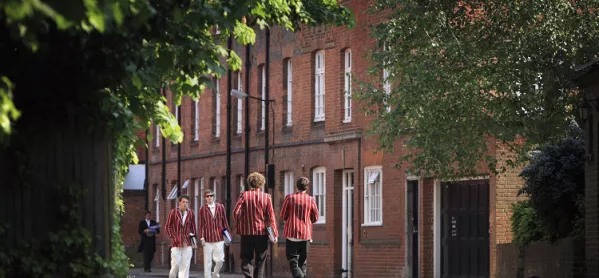- Home
- Boarding school ‘can break cycle of risk’
Boarding school ‘can break cycle of risk’

Attending a boarding school can “break the cycle of risk” for vulnerable children, according to research published today.
A study of 52 young people in Norfolk, who were either in care or at risk of going into local authority care, found that that the majority were removed from the risk register after taking a boarding school placement.
On the academic side, GCSE results exceeded the national average for looked-after children in both maths and English, the study found.
There were also favourable cost savings for councils, with boarding school still a significantly cheaper option than the prospect of the youngsters ending up in care.
The research looked at the outcomes of efforts by Norfolk Boarding School Partnership, a programme that places vulnerable youngsters in boarding schools as an alternative to option to being, or at risk of being, in local authority care.
It is hoped the outcomes may help to sway other councils to engage in similar programmes for youngsters on their watch.
Last year, a government-backed pilot scheme offering free boarding school places to youngsters at risk of “poor social and emotional outcomes” had to be abandoned due to the lack of take-up, after just five pupils were put forward for the trial.
Lord Agnew, minister for the schools system, urged councils to take note of the positive impact that boarding school placements can have on vulnerable children.
“It is right that all children should be given the opportunity to reach their full potential and this important piece of work demonstrates that - for the right person, at the right school, at the right time - boarding school can be highly effective in improving both social and educational outcomes.
“I urge local authorities to consider these findings and the positive impact boarding school placements can have on vulnerable children.”
‘Transforming lives’
The study, commissioned by the Boarding Schools Partnership - an alliance between the Department for Education and a range of organisations - looked at the outcomes of 52 youngsters in Norfolk in or at risk of going into care who were placed in state and independent boarding over the past 10 years.
The study found that almost three-quarters (71 percent) of boarders showed a reduced level of risk and almost two-thirds (63 percent) moved off the risk register completely.
More than half of the boarders who were looked-after children (LAC) ceased to be LAC “as a result of their successful development at boarding school”.
A higher proportion of the children attained an A*-C or grade 4+ in both maths and English than looked-after children nationally.
Whilst school fees paid by Norfolk County Council ranged from £11,000 per year for state schools to £35,000 for independent schools, this was considerably less than the £56,200 on average spent on children in their care.
Colin Morrison, Boarding Schools Partnership chair, said work was underway with councils to develop similar schemes. “There is now a strong interest in giving increasing numbers of vulnerable young people the opportunity of boarding school to transform their lives and prospect.”
Lord Adonis, the Labour peer and former education minister who was in care as a child, is among those to laud the benefits of a state-funded boarding school education.
Responding to the report, the Local Government Association said the best place for most vulnerable children was in a family home.
Richard Watts, chair of the its Children and Young People Board, said: “When it comes to housing vulnerable children, councils will always try to provide the most appropriate placement for an individual child’s needs.
“For most children, this will be in a family home such as that provided by foster carers or extended family, where they can get the love and support that they need to flourish, but social workers will always consider a range of options, whether that’s foster care, a children’s home or another form of provision.”
Keep reading for just £1 per month
You've reached your limit of free articles this month. Subscribe for £1 per month for three months and get:
- Unlimited access to all Tes magazine content
- Exclusive subscriber-only stories
- Award-winning email newsletters



